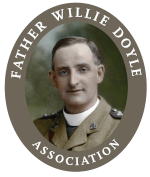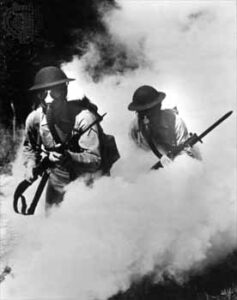Fr Willie had many incredibly close shaves with death during the almost 2 years he spent as a military chaplain. He has recorded many of these in his diaries and in the letters he sent home to his father. One of these dramatic moments occurred on the night of April 26 and early morning April 27 1916. Here is an excerpt from a letter home to his father which recounts the experience in a lot of detail. A few things stand out in this letter. Firstly the fact that he recorded the event in so much detail in order to keep his father informed tells us something of Fr Willie’s filial respect and love. How many of us would easily excuse ourselves of the duty of writing home, preferring instead to sleep or take it easy in some other way? Secondly there is his trust in Providence and the seemingly supernatural help he received that day. Did he imagine this help, or did his guardian angel assist him in a special way on this day? We do not know, but it would not be the first time in history that somebody has received specific assistance in this form. Thirdly, we see something of the value of the priesthood and the sacraments, and how important the presence of the priest was to the dying soldiers, and how far Fr Willie would go to assist them.
Tomorrow we will reproduce the text of a letter he wrote a year later in which he gives even more details of the danger he faced on this occasion (he didn’t reveal everything to his father all at once in case it worried him) and on Tuesday we will reproduce part of a letter which reveals some of the harrowing work he had to undertake in the days following this gas attack.
About four o’clock (in the morning) the thought struck me that it would be a good thing to walk back to the village to warm myself and say an early Mass for the nuns, who usually have to wait hours for some chaplain to turn up. They have been very kind to me, and I was glad of this chance of doing this little service to them. The village is about two miles behind our trench, in such a position that one can leave cover with perfect safety and walk there across the fields. As I left the trench about 4.45, the sun was just rising. It was a perfect morning with a gentle breeze blowing. Now and again came the crack of a rifle, but all was unusually calm and still: little did I think of the deadly storm about to burst and hurry so many brave men into eternity. I had just reached a point half way between our trenches and the village when I heard behind me the deep boom of a German gun quickly followed by a dozen others. In a moment our gunners replied and before I could well realize what was taking place, the air was alive with shells. At first I thought it was just a bit of the usual good morning greeting and that after ten minutes artillery strafe all would be quiet once more. But I soon saw this was a serious business, for gun after gun, and battery after battery, was rapidly coming into action, until at the lowest number 500 guns were roaring all round me. It was a magnificent if terrifying sight. The ground fairly shook with the roar of the guns, for the heavies now had taken up the challenge, and all round the horizon I could see the clouds of smoke and dust from the bursting shells as both sides kept searching for their opponents’ hidden cannon.
There I stood in the very centre of the battle, the one man of all the thousands engaged who was absolutely safe, for I was away from the trenches, there were no guns or troops near me to draw fire, and though tens of thousands of shells went over my head, not even a splinter fell near me. I felt that the good God had quietly dumped me there till all danger had passed.
After a while seeing that this heavy shelling meant an attack of some kind, and that soon many a dying man would need my help, I turned round and made my way towards the ambulance station. As I approached the trenches I noticed the smoke from the bursting shells, which was hanging thickly over them and was being driven towards me across the fields. For once, I said to myself, I am going to smell the smoke of a real battle, and I stepped out quite gaily— the next moment I had turned and was running back for my life — the Germans had started a poison gas attack which I had mistaken for shell smoke, and I had walked straight into it!
After about 20 yards I stopped to see what was to be done, for I knew it was useless to try and escape by running. I saw (assuredly again providentially) that I had struck the extreme edge of the gas and also that the wind was blowing it away to my left. A hundred yards in the opposite direction, and I was safe. I must confess for a moment I got a shock, as a gas attack was the very last thing I was thinking about — in fact we thought the Germans had given it up. Fortunately too I had not forgotten the old days of the chemistry room at Ratcliffe College nor Brother Thompson and his stink bottles so I knew at the first whiff it was chlorine gas and time for this child to make tracks.
But I was not yet out of the wood. Even as I was congratulating myself on my good fortune, I saw both right and left of where I stood the green wave of a second gas attack rolling towards me like some huge spectre stretching out its ghostly arms. As I saw it coming, my heart went out to God in one fervent act of gratitude for His goodness to me. As probably you know we all carry smoke helmets slung over our shoulders in a case, to be used against a gas attack. That morning as I was leaving my dugout I threw my helmet aside. I had a fairly long walk before me, the helmet is a bit heavy on a hot day, and as I said, German gas was most unlikely. So I made up my mind to leave it behind. In view of what happened, it may appear imagination now, but a voice seemed to whisper loudly in my ear: ‘Take your helmet with you; don’t leave without it’ (On the anniversary of this escape he once more asserted: ‘Some invisible, almost physical, force turned me back to get my helmet.’) I turned back and slung it over my shoulder. Surely it was the warning voice of my guardian angel, for if I had not done so, you would never have had this letter.
I wonder can you picture my feelings at this moment? Here was death in its most awful form sweeping down towards me; thank God I had the one thing which could save me, but with a carelessness for which I ought to be scourged, I had never tried the helmet on and did not know if it were in working order. In theory, with the helmet on I was absolutely safe, but it was an anxious moment waiting for the scorching test, and to make things more horrible, I was absolutely alone. But I had the companionship of One Who sustained me in the hour of trial, and kneeling down I took the Pyx from my pocket and received the Blessed Eucharist as Viaticum. I had not a moment to spare, and had my helmet just fixed when I was buried in a thick green fog of poison gas. In a few moments my confidence returned for the helmet worked perfectly and I found I was able to breathe without any ill effects from the gas.
By the time I got down to the dressing station the guns had ceased fire, the gas blown away, and the sun was shining in a cloudless sky. Already a stream of wounded was coming in and I soon had my hands full, when an urgent message reached me from the front trench. A poor fellow had been desperately wounded, a bullet had cut him like a knife across the stomach, with results you can best imagine. He was told he had only a few minutes to live, and asked if they could do anything for him. ‘I have only one wish before I die’, he answered, ‘could you possibly get me Fr. Doyle? I’ll go happy then.’ It was hard work to reach him, as parts of the communication trench were knee deep in water and thick mud. Then I was misdirected and sent in the wrong direction, but I kept on praying I might be in time, and at last found the dying man still breathing and conscious. The look of joy, which lit up his face when I knelt beside him, was reward enough for the effort I had made. I gave him Absolution and anointed him before he died, but occupied as I was I did not notice that a third gas attack had begun. Before I could get my helmet out and on, I had swallowed a couple of mouthfuls, which did me no serious harm beyond making me feel rather sick and weak.
As I made my way slowly up the trench, feeling altogether ‘a poor thing,’ I stumbled across a young officer who had been badly gassed. He had got his helmet on, but was coughing and choking in a terrible way. ‘For God’s sake,’ he cried, ‘ help me to tear off this helmet — I can’t breathe. I’m dying.’ I saw if I left him the end would not be far; so catching hold of him, I half carried, half dragged him up the trench to the medical aid post. I shall never forget that ten minutes, it seemed hours. I seemed to have lost all my strength: struggling with him to prevent him killing himself by tearing off his helmet made me forget almost how to breathe through mine. I was almost stifled, though safe from gas, while the perspiration simply poured from my forehead. I could do nothing but pray for help and set my teeth, for if I once let go, he was a dead man. Thank God, we both at last got to the aid post, and I had the happiness of seeing him in the evening out of danger, though naturally still weak. Fortunately this last attack was short and light, so that I was able to take off my helmet and after a cup of tea was all right. The best proof I can give you of this, lies in the fact that I have since put in three of the hardest days’ work of my life which I could not possibly have done had I been really gassed, as its first effect is to leave one as helpless as a child.

